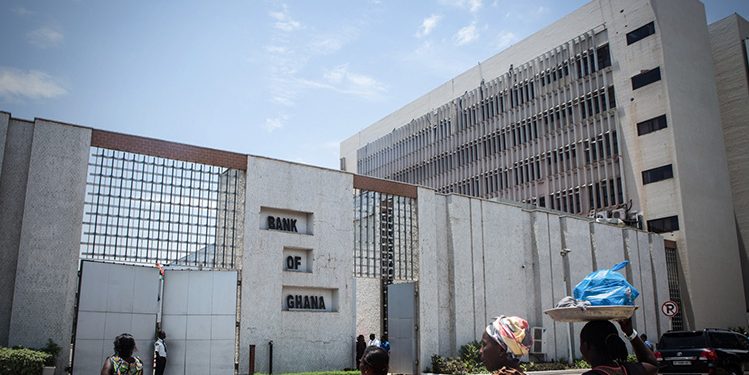Even though the Bank of Ghana has announced that it is maintaining its benchmark Monetary Policy Rate at 14.5 percent for the next two months, borrowers are benefitting from the fact that interest rates continue to fall in Ghana despite government’s unprecedented demand for fiscal deficit financing.
Ultimately monetary easing by the central bank has negated the upward pressure on interest rates created by higher demand for credit by government although inevitably commercial banks having been moving from loans to the private sector, towards lending to government.
Lower interest rates at a time that government’s unprecedentedly high demand for credit is supposed to raise them – going by the basic economic principle of demand and supply – is a veritable achievement, effectively turning basic economic doctrine, proven over the past nearly two hundred years on its head. It has been achieved by the combination of several initiatives thought out outside of the box.
The biggest single one was the Bank of Ghana’s extending GHc10 billion in fiscal deficit financing to government, which gave the state access to this money without affecting the quantum available to private sector borrowers. Ironically, this was controversial at the time the BoG offered government the money, because the central bank had committed to the International Monetary Fund in 2016 not to fund the fiscal deficit at all. But because of the peculiar circumstances the BoG provided this financing without triggering any significant macroeconomic instability because the economy was operating below full capacity.
The result was that the money market was left with enough money to cater for private sector borrowers because government’s extra demand for fiscal deficit financing had been largely catered for by the central bank.
Another initiative was the monetary stimulus provided by the BoG in several ways. The minimum capital and reserve requirements were lowered, monetary incentives were offered for banks to engage in repo transactions and regulatory sanctions on non performing loan assets on bank balance sheets were temporarily reduced.
Furthermore government itself negotiated a 200 basis points cut on new loans booked by banks during the COVID 19 crisis. This came on the back of a reduction in the Ghana Reference Rate, which is computed by the banks in close consultation with the BoG itself and which effectively serves as the base lending rate for the entire industry with each bank adding on a margin for each loan it gives, serving as the risk premium for each particular loan.
All these pushed short term interest rates downwards despite government’s bigger appetite for debt. This is key since private sector borrowers take primarily short term credit since that is what banks primarily offer, due to the dearth of long term deposits to fund long term loans.
However the BoG deliberately allowed longer term interest rates to rise to retain the interest of foreign investors who are the major subscribers to government debt securities issued over long tenors.
Now, however, with the cedi exchange rate proving more or less stable – thereby removing the risk to foreign portfolio investors of exchange rate losses – and inflation only slightly above single digits, those medium to long term rates are now being allowed to fall, too.
This means medium and long term borrowers from banks and issuers of corporate bonds on both the Ghana Stock Exchange itself and the Ghana Alternative stock market can start benefitting from monetary easing, just as the majority of business borrowers, who borrow at the short end of the spectrum have been doing since the second quarter of last year.
Interest rates on the money market broadly showed downward trends across the yield curve through most of last year in response to deliberate monetary policy. The 91-day declined to 14.1percent in December 2020 from 14.7 percent a year earlier, and the 182-day Treasury bill rate fell to 14.1 percent from 15.2 percent over the same comparative period.
Similarly, two year notes declined from 20.95 percent by the end of 2019 to 20.20 percent by the end of last year. The rates on three and five year bonds were actually increasing immediately prior to the commencement of monetary easing peaking at 20.75 percent and 21.7- percent respectively by March before the sharp cut in the Monetary Policy Rate by 150 basis points (from 16 percent to the current 14.50 percent) subsequently pushed them down to 19.25 percent and 19.85 percent respectively as at the end of last year.
This has been the result of deliberate policy since most credit in Ghana is provided over short tenors and therefore the effective cost of borrowing for most enterprises and households continues to decline.
But the most recent trend reversals have been at the longer end of the money market. Until a few months ago rates on long tenured securities were allowed to rise to retain the interest of foreign portfolio investors who demand a wide premium on their cedi-denominated investments to protect them against possible – and until very recently, likely – foreign exchange losses caused by cedi depreciation. Since the last quarter of 2020 however, with the cedi having proved more or less stable and foreign investors faced with uncompetitive, near zero coupon rates in their home countries, the rates on these longer term rates have been falling too.
On the secondary bond market, yields on 6-year, 7-year, 10-year, and 15-year bonds had all declined by the end of 2020 from the peaks reached in October. Six year bond yields were down to 19.76 percent, from 19.96 percent. Seven year bond yields were down to 19.74 percent from 20.09 percent; 10 year bonds were down to 21.00 percent from 21.22 percent; 15 year bonds down to 21.23 percent from 21.83 percent; and 20 year bond yields had fallen to 22.28 percent from 22.40 percent.
Falling long term bond rates should encourage the corporations that have approval to issue bonds to the tune of a cumulative GHc4.4 billion, from stockmarket managers and regulators, but who have suspended their phased issuance over the past year because of rising coupon rates.
The weighted average interbank rate declined to 13.6 percent from 15.2 percent, last year reflecting the reduction in the monetary policy rate in March 2020, and improved liquidity conditions on the market. Similarly, average lending rates of banks declined to 21.1 percent in December 2020 from 23.6 percent recorded in the corresponding period of 2019, consistent with the monetary policy stance.
Going forward, even though the MPR has not been reduced yet, long term interest rates are likely to fall further to flatten the inordinately steep yield curve – which has resulted from falling short term rates and rising long term rates for the past nine months – even if short term rates do not fall any further. When the MPR is eventually lowered further – still a distinct possibility sometime later this year, then short term rates will fall further too.
Which is why the private sector is not complaining about the MPR being left where it is for now.’








